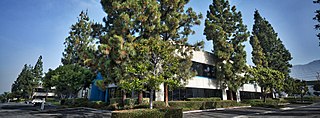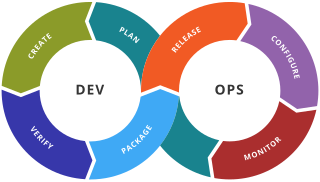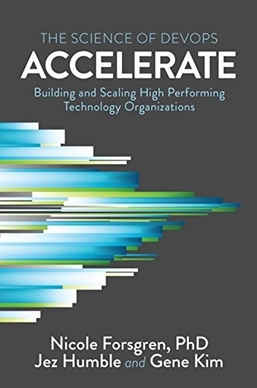Selenium is an open source umbrella project for a range of tools and libraries aimed at supporting browser automation. It provides a playback tool for authoring functional tests across most modern web browsers, without the need to learn a test scripting language. It also provides a test domain-specific language (Selenese) to write tests in a number of popular programming languages, including JavaScript (Node.js), C#, Groovy, Java, Perl, PHP, Python, Ruby and Scala. Selenium runs on Windows, Linux, and macOS. It is open-source software released under the Apache License 2.0.
Build automation is the process of automating the creation of a software build and the associated processes including: compiling computer source code into binary code, packaging binary code, and running automated tests.

Parasoft is an independent software vendor specializing in automated software testing and application security with headquarters in Monrovia, California. It was founded in 1987 by four graduates of the California Institute of Technology who planned to commercialize the parallel computing software tools they had been working on for the Caltech Cosmic Cube, which was the first working hypercube computer built.
DevOps is a methodology in the software development and IT industry. Used as a set of practices and tools, DevOps integrates and automates the work of software development (Dev) and IT operations (Ops) as a means for improving and shortening the systems development life cycle.
Continuous testing is the process of executing automated tests as part of the software delivery pipeline to obtain immediate feedback on the business risks associated with a software release candidate. Continuous testing was originally proposed as a way of reducing waiting time for feedback to developers by introducing development environment-triggered tests as well as more traditional developer/tester-triggered tests.
Continuous delivery (CD) is a software engineering approach in which teams produce software in short cycles, ensuring that the software can be reliably released at any time and, following a pipeline through a "production-like environment", without doing so manually. It aims at building, testing, and releasing software with greater speed and frequency. The approach helps reduce the cost, time, and risk of delivering changes by allowing for more incremental updates to applications in production. A straightforward and repeatable deployment process is important for continuous delivery.
CloudBees is an enterprise software delivery company. Sacha Labourey and Francois Dechery co-founded the company in early 2010, and investors include Matrix Partners, Lightspeed Venture Partners, HSBC, Verizon Ventures, Golub Capital, Goldman Sachs, Morgan Stanley, and Bridgepoint Group.

Gatling is a load- and performance-testing framework based on Scala, Akka and Netty. The first stable release was published on January 13, 2012. In 2015, Gatling's founder, Stéphane Landelle, created a company, dedicated to the development of the open-source project. According to Gatling Corp's official blog, Gatling was downloaded more than 1,000,000 times (2021). In June 2016, Gatling officially presented Gatling FrontLine, Gatling's Enterprise Version with additional features.
Idera, Inc. is the parent company of a portfolio of brands that offer B2B software including database tools, application development tools, test management tools, and DevOps tools. It is headquartered in Houston, Texas and has offices in Australia, Austria, and the United Kingdom. It is owned by the private equity firms HGGC, Partners Group and TA Associates.
A headless browser is a web browser without a graphical user interface.
Perforce Software, Inc. is an American developer of software used for developing and running applications, including version control software, web-based repository management, developer collaboration, application lifecycle management, web application servers, debugging tools and agile planning software.

A DevOps toolchain is a set or combination of tools that aid in the delivery, development, and management of software applications throughout the systems development life cycle, as coordinated by an organisation that uses DevOps practices.
Site reliability engineering (SRE) is a set of principles and practices that applies aspects of software engineering to IT infrastructure and operations. SRE claims to create highly reliable and scalable software systems. Although they are closely related, SRE is slightly different from DevOps.

Tricentis is a software testing company founded in 2007 and headquartered in Austin, Texas. It provides software testing automation and software quality assurance products for enterprise software.

CircleCI is a continuous integration (CI) and continuous delivery (CD) platform that can be used to implement DevOps practices. The company was founded in September 2011 and has raised $315 million in venture capital funding as of 2021, at a valuation of $1.7 billion. CircleCI is one of the world's most popular CI/CD platforms. Facebook, Coinbase, Sony, Kickstarter, GoPro, and Spotify used CircleCI in 2019.
DataOps is a set of practices, processes and technologies that combines an integrated and process-oriented perspective on data with automation and methods from agile software engineering to improve quality, speed, and collaboration and promote a culture of continuous improvement in the area of data analytics. While DataOps began as a set of best practices, it has now matured to become a new and independent approach to data analytics. DataOps applies to the entire data lifecycle from data preparation to reporting, and recognizes the interconnected nature of the data analytics team and information technology operations.

Katalon Platform is an automation testing software tool developed by Katalon, Inc. The software is built on top of the open-source automation frameworks Selenium, Appium with a specialized IDE interface for web, API, mobile and desktop application testing. Its initial release for internal use was in January 2015. Its first public release was in September 2016. In 2018, the software acquired 9% of market penetration for UI test automation, according to The State of Testing 2018 Report by SmartBear.

MLOps or ML Ops is a paradigm that aims to deploy and maintain machine learning models in production reliably and efficiently. The word is a compound of "machine learning" and the continuous development practice of DevOps in the software field. Machine learning models are tested and developed in isolated experimental systems. When an algorithm is ready to be launched, MLOps is practiced between Data Scientists, DevOps, and Machine Learning engineers to transition the algorithm to production systems. Similar to DevOps or DataOps approaches, MLOps seeks to increase automation and improve the quality of production models, while also focusing on business and regulatory requirements. While MLOps started as a set of best practices, it is slowly evolving into an independent approach to ML lifecycle management. MLOps applies to the entire lifecycle - from integrating with model generation, orchestration, and deployment, to health, diagnostics, governance, and business metrics. According to Gartner, MLOps is a subset of ModelOps. MLOps is focused on the operationalization of ML models, while ModelOps covers the operationalization of all types of AI models.

Accelerate: The Science of Lean Software and DevOps: Building and Scaling High Performing Technology Organizations is a software engineering book co-authored by Nicole Forsgren, Jez Humble and Gene Kim. The book explores how software development teams using Lean Software and DevOps can measure their performance and the performance of software engineering teams impacts the overall performance of an organization.
TestOps refers to the discipline of managing the operational aspects of testing within the software delivery lifecycle.






